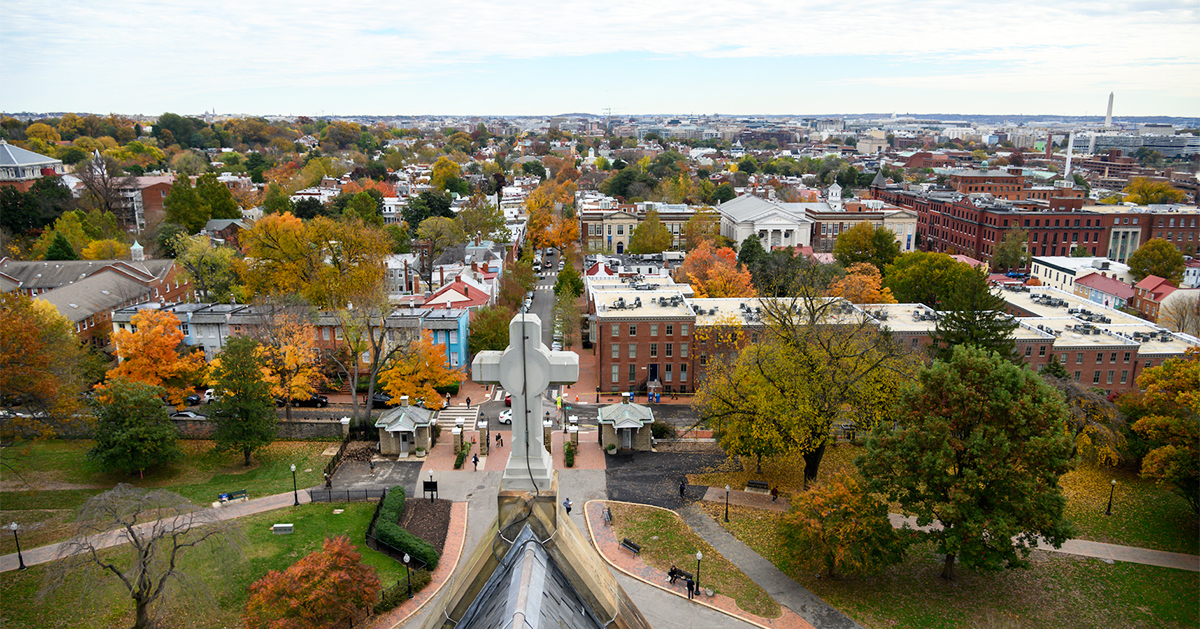Georgetown Humanities Initiative Promotes Collaboration and Community
The Georgetown Humanities Initiative was conceived by the College as a way to foster collaborative projects across departments and schools that highlight the human element of research and service. In the wake of the COVID-19 pandemic and increased awareness of racial inequalities that persist in society, inaugural director of the initiative Nicoletta Pireddu launched Humanities and Cura Personalis in Times of Crisis to emphasize the importance of fostering personal connections in academia and beyond.
“The humanities are fields of study that examine problems by crossing boundaries,” says Pireddu. “These crises have shown what happens when you act without empathy or understanding for other people. The Humanities Initiative will bring together faculty, students, alumni and the greater community to help create a world more centered on caring for the whole person.”
Crisis and Cura Personalis
Pireddu envisions Georgetown as the hub of humanities research in Washington DC and beyond. She said that the Jesuit tradition of cura personalis “uniquely positions Georgetown to become a leader in the greater community.”
“Here we care about your intellect and who you are as a whole person,” she continues. “We genuinely seek to understand what it means to be human. Georgetown Humanities adopts a humanistic framework to provide new insights into timeless issues as well as into the challenges of our collective present.”
Chris Celenza, dean of Georgetown College says that Georgetown faculty are well positioned to make an enormous impact both on and off the Hilltop.
“Our sterling humanities faculty members, across a wide variety of disciplines, produce astounding research, integrate our students both undergraduate and graduate into their work, and regularly engage with the world outside of the university’s walls,” he says. “Georgetown Humanities will help accelerate their work in those three respects, even as it will open Georgetown’s doors further to the wider community.”
As part of the initiative, Pireddu has planned several upcoming events for the fall semester. On September 30, there will be a virtual panel on the significance of voting that will feature the University of Alabama professors Kathleen Hale and Mitchell Brown, who authored the book How We Vote, which was published by Georgetown University Press. They will be joined by Georgetown professors Hans Noël, Diana Owen, and Robert Patterson.
On October 15, Pireddu alongside the Medical Humanities Program and the Georgetown Maker Hub will host New Yorker writer Margaret Talbot in “A Conversation about Public Science During a Pandemic.” And on October 20, the Georgetown Humanities Initiative in collaboration with the Lannan Center for Poetics and Social Practice and the Medical Humanities Program will host award-winning novelist Valeria Luiselli for a talk titled “Medicine at the Border.”
Pireddu is also organizing events for students and a professional development series focusing on public-facing work. She hopes to bring members from outside of Georgetown to join the advisory board so that the initiative can be enriched by external perspectives and the board members can serve as mentors to students.
“More than ever, the world needs the humanities. We are building this initiative piece by piece,” says Pireddu. “With the support of the university and our unique location in the nation’s capital we have an exciting opportunity to think big and render the humanities a crucial component in innovative research and pedagogy, in the private sector, and in community outreach.”
